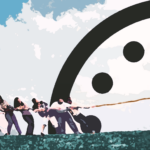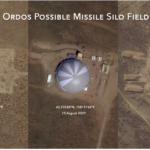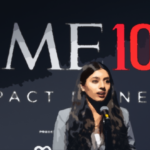Interview: California Congressman Ted Lieu on what you can do about existential threats
By John Mecklin | January 15, 2024
Interview: California Congressman Ted Lieu on what you can do about existential threats
By John Mecklin | January 15, 2024
Amid the various confused and contentious votes called as part of Republican efforts to appoint a new Speaker of the House of Representatives in October, Congressman Ted Lieu took time to talk with me about existential threats. A Democrat who represents south and west Los Angeles, Lieu has long been known for his efforts to reduce the threats posed by nuclear weapons and climate change. Since 2015, he has repeatedly sponsored the Climate Solutions Act[1], which would require 100 percent of electricity sold in the United States be generated from renewable sources by 2035. He is also known for his support for two bills that aim to reduce nuclear risk and that have unwieldy names: the Restricting First Use of Nuclear Weapons Act[2], which would prohibit a US president from launching a nuclear attack without previous authorization from Congress, and a bipartisan bill—the Block Nuclear Launch by Autonomous Artificial Intelligence Act[3]—that aims to prevent the launch “of any nuclear weapon by an automated system, without meaningful human control.”
But in this interview, I didn’t want to know what Lieu intended to do in Congress about those three bills, which have yet to pass, or about existential threats more generally. For this issue, I wanted to know what he would tell individual Bulletin readers who want to know what they can do themselves to reduce the risks of nuclear weapons and climate change. Here is what he said.
(Editor’s note: This interview has been condensed and edited for brevity and clarity.)
John Mecklin: Every January, the Bulletin sets the Doomsday Clock. It warns people; concerns people, and maybe even frightens. And every time the Clock is set, we get flooded with e-mails saying: “But what can I do? I’m just an individual person; how can I affect things like nuclear weapons and climate change?” And a lot of them say, “Oh, our elected people don’t listen to us.” In your experience, do people in Congress listen when their constituents are really concerned about something?
Ted Lieu: So let me put it this way: As a member of Congress, for two-year legislative cycles—every two years, I vote over 1,000 times on the floor or in committee. And I’d say on 80 to 90 percent of those votes, I don’t get a single meeting, or e-mail, or phone call. So when you lobby your member of Congress or their staff, or try to have a phone conversation, or set up a meeting, or send an e-mail, that is important, because it causes me and my staff to think: “Well, why are we getting these folks calling in or writing in about this particular issue?” And I can guarantee you, most members of Congress don’t walk around thinking about nuclear weapons. That’s just not something that’s in the top 20 list… But you can make [us] think about it, by getting engaged in the process and trying to contact your representatives, and by putting this issue in front of them.
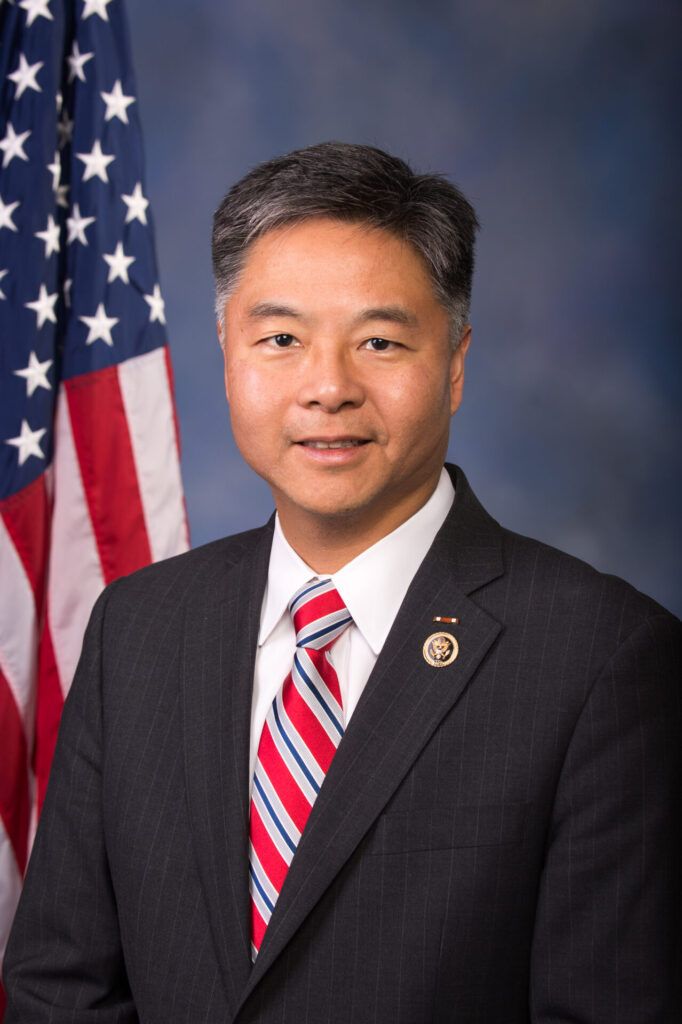
Mecklin: Is there any one method or way that’s more effective than others? I couldn’t imagine that voicemail messages piling up really affects much. Are e-mails or handwritten letters more effective?
Lieu: So, an in-person meeting, if you are able to schedule that, will be the most effective with a member of Congress or their staff. E-mails can be effective if they’re uniquely written, and there happens to be a fair number of them from like-minded individuals. And they’re going to have to be to the member of Congress who represents you. If I get an e-mail from someone in the middle of Nebraska, that’s not really going to have much of an effect on me. If I get an e-mail from my hometown of Torrance, California, that will have more of an effect.
Mecklin: A lot of those who write in to us are younger people who want to know how they can affect nuclear weapons or climate change. Always, my first advice is, “well, vote; if you care about this, vote.” But they act as though their vote doesn’t matter. They don’t think voting is important. Could younger people change things with their votes?
Lieu: If we had higher voter turnout among young people, it would change America. And if that would occur across the world, it would change the world.
Now, is one individual vote going to matter? Probably not, although there have been some cases in the history of where elections that were tied or decided by only a handful of votes. But you just need enough young people to think that voting is important to cause change. That doesn’t happen if every young person just says, “Oh, my vote doesn’t matter. I’m not going to vote.” Well, it can matter if a bunch of people who are young think the same way. So that’s what we hope happens.
Mecklin: What about people who are concerned about nuclear weapons, in particular—what’s the one thing you think citizens should focus on? Is it the no-first-use act that you and Massachusetts Senator Markey have introduced—I think several times now—or something else?
Lieu: It’d be fantastic if we could get the bill I introduced with Senator Markey signed into law. In a Republican-controlled House of Representatives, that’s unlikely this term. But we’re going to keep pushing, and my view of politics is everything seems impossible until it happens; you don’t know when something will happen.
And if you keep pushing the issue, public opinion could all of a sudden start breaking your way and start causing change. Or you might get some changes in the makeup of Congress, in the House or the Senate, that could cause changes. The Biden administration could also, essentially, take our bill and make it their policy of no-first-use of nuclear weapons.
Sometimes you introduce a bill, not just because you want it to become law, but to try to see if the administration will simply do it themselves.
In addition, I have also introduced bipartisan legislation to say that, basically, no matter how amazing artificial intelligence ever gets, that we will never let it launch a nuclear weapon by itself. There always has to be human in the loop. And my hope is we can get that signed into law at some point as well.
Mecklin: Another more general concern that people write in to us about all the time involves just the ever-increasing size of the defense budget. Every year, it seems to go up—even more than the Pentagon asks for. How do you think ordinary citizens can affect that? Or can they? How can that be changed?
Lieu: I voted for an amendment to cut the budget of the Department of Defense; we didn’t have enough votes to get that into law. So I agree with people who believe our defense budget is too big. It is too big, and I think we need to make it less big. The best way to do that is through public opinion and through public pressure. And so having more people contact their members of Congress and letting their views be known would be helpful.
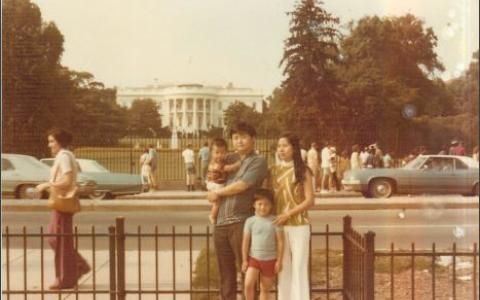
Mecklin: As a final question, I’m going to put you on the spot a little. For five minutes here, you’re me. You’re putting together an issue of the Bulletin that gives answers when people ask, “But what can I do?” What would you tell people they can do to affect nuclear weapons and climate change? What’s your message to them?
Lieu: First, they should try to contact their member of Congress, to try to schedule a meeting. They could also try to work with various nonprofits that are in the nuclear space and try to go along with that nonprofit when it schedules a meeting. They could try to contact a member of Congress through email or social media or through the phone.
A second thing people can do is think about writing letters to the editor. It is true that newspapers do get many letters to the editor. It’s also true many of those letters come from the same people. So start writing in. Eventually you’re going to get published, and you can start changing hearts and minds that way.
And then the third way would be to support organizations that are trying to advocate in this space, whether it’s through the Bulletin or another nonprofit that is trying to cause change. And you could do that either through money, or through your time, or through somebody promoting this issue or that nonprofit.
And, again, you never know in politics when something will happen, based on public pressure or public opinion. You just have to keep pushing and pushing.
Mecklin: In your experience, can public pressure work? Do people in Congress respond to it?
Lieu: It depends on the issue, and it depends on the intensity of the public pressure. So, look: If a member of Congress is a strong believer in the Second Amendment, you’re probably not going to change their mind and get them to vote for a ban on assault weapons, right? That’s not going to happen. But they might not think very much or know anything about nuclear weapons.
And I think this is a particular issue where educating members of Congress—or having people contact members of Congress—can have an effect, because not that many members of Congress run for Congress because of the nuclear weapons issue. Most members of Congress run for Congress because they have deeply held beliefs on a variety of issues, and they want those beliefs implemented into law. So, for example, I believe climate change is a massive problem. I’m a strong environmentalist, and one reason I ran for Congress is to make the environment better. It turns out that I get support from people who are environmentalists in terms of time and money and resources and so on. But it’s not like I’m voting for a bill to mitigate climate change because some environmentalists gave me money; it’s actually the other way around. They decide to give me money because I’m an environmentalist.
Now, for many of these issues, people have strong beliefs—whether it’s the issue of guns or reproductive freedom or the environment and so on. But again, with nuclear weapons, it’s a little different. Many members of Congress don’t run for Congress because of nuclear weapons. So it’s just an area where I think you can get members of Congress to engage and focus on and think about in a different way, because they may not have a very strongly held belief one way or the other.
ENDNOTES
[1] See https://lieu.house.gov/media-center/press-releases/rep-lieu-reintroduces-bold-climate-change-bill-0
[2] See https://www.markey.senate.gov/news/press-releases/sen-markey-and-rep-lieu-announce-legislation-to-limit-us-presidents-power-to-unilaterally-start-nuclearwar#:~:text=Markey%20(D%2DMass.),without%20prior%20authorization%20from%20Congress.
[3] See https://www.markey.senate.gov/imo/media/doc/block_nuclear_launch_by_autonomous_ai_act_-_042623pdf.pdf
Together, we make the world safer.
The Bulletin elevates expert voices above the noise. But as an independent nonprofit organization, our operations depend on the support of readers like you. Help us continue to deliver quality journalism that holds leaders accountable. Your support of our work at any level is important. In return, we promise our coverage will be understandable, influential, vigilant, solution-oriented, and fair-minded. Together we can make a difference.
Keywords: 2024 election, Congress, activism, existential threat, nuclear weapons
Topics: Nuclear Risk, Opinion, Special Topics


